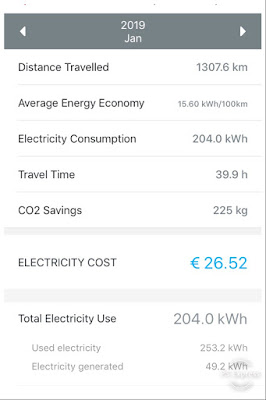As you can see from the image above, the car averaged 15.6kWh/100km in January (down slightly from the 15.9 in December). As before, I would say this is pretty good for the time of year, and is reasonably consistent over the three-months of this Project so far.
For the month of January I did the vast majority of the charging at home. I used the rapid charger near Carnmore Cross a couple of times, but not much in the scheme of things. The total cost of €26.52 is therefore a reasonably accurate reflection of "fuel" costs for the month.
This works out at a cost of €1.99 per 100km. By way of comparison, a reasonably good efficiency in a petrol car would be 5l/100km. At current petrol prices around Galway (€1.35-ish per litre), this equates to about €6.75 per 100km. Over the distance travelled in January, such a petrol car would have cost about €88 in fuel.
Something worth noting in the image is the amount of electricity generated by the car. You hear a lot about "self-charging" cars in the media at the moment. Leaving out the fact that any car with an alternator is technically "self-charging", the figures for the amount of energy regenerated by an EV are quite good. The car generated 49.2kWh by utilising the motor as a dynamo during slowing-down in January. If we work off 15.6kWh/100km, this means that the car generated enough power to cover 315km all by itself. 315km absolutely for free! How far can some of the "self-charging" cars go by battery power? Reports from The Netherlands suggest its a matter of 2-3km per charge. Just saying!
This works out at a cost of €1.99 per 100km. By way of comparison, a reasonably good efficiency in a petrol car would be 5l/100km. At current petrol prices around Galway (€1.35-ish per litre), this equates to about €6.75 per 100km. Over the distance travelled in January, such a petrol car would have cost about €88 in fuel.
Something worth noting in the image is the amount of electricity generated by the car. You hear a lot about "self-charging" cars in the media at the moment. Leaving out the fact that any car with an alternator is technically "self-charging", the figures for the amount of energy regenerated by an EV are quite good. The car generated 49.2kWh by utilising the motor as a dynamo during slowing-down in January. If we work off 15.6kWh/100km, this means that the car generated enough power to cover 315km all by itself. 315km absolutely for free! How far can some of the "self-charging" cars go by battery power? Reports from The Netherlands suggest its a matter of 2-3km per charge. Just saying!
*A note on the stated CO2 Savings shown above:
This figure is calculated by Nissan, not by me. Please refer to the note on this page for more information about this.

It was really insightful.
ReplyDeleteThanks for such a nice content.
Cheers
BTW if anyone interested more have a look batterymodeon.com thanks